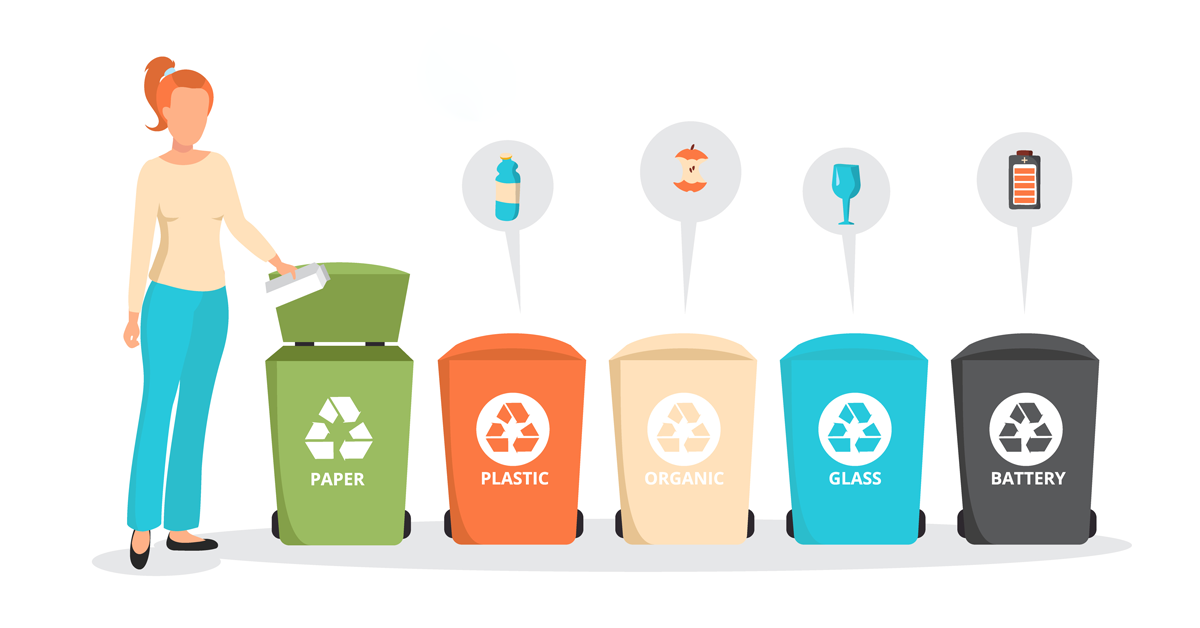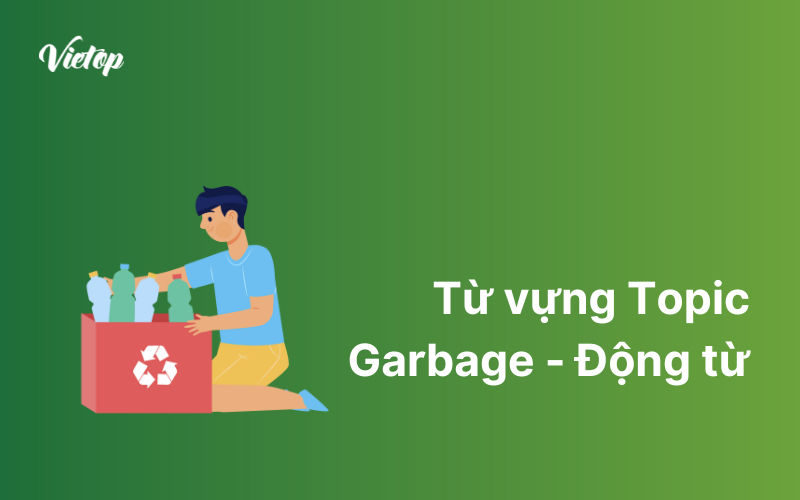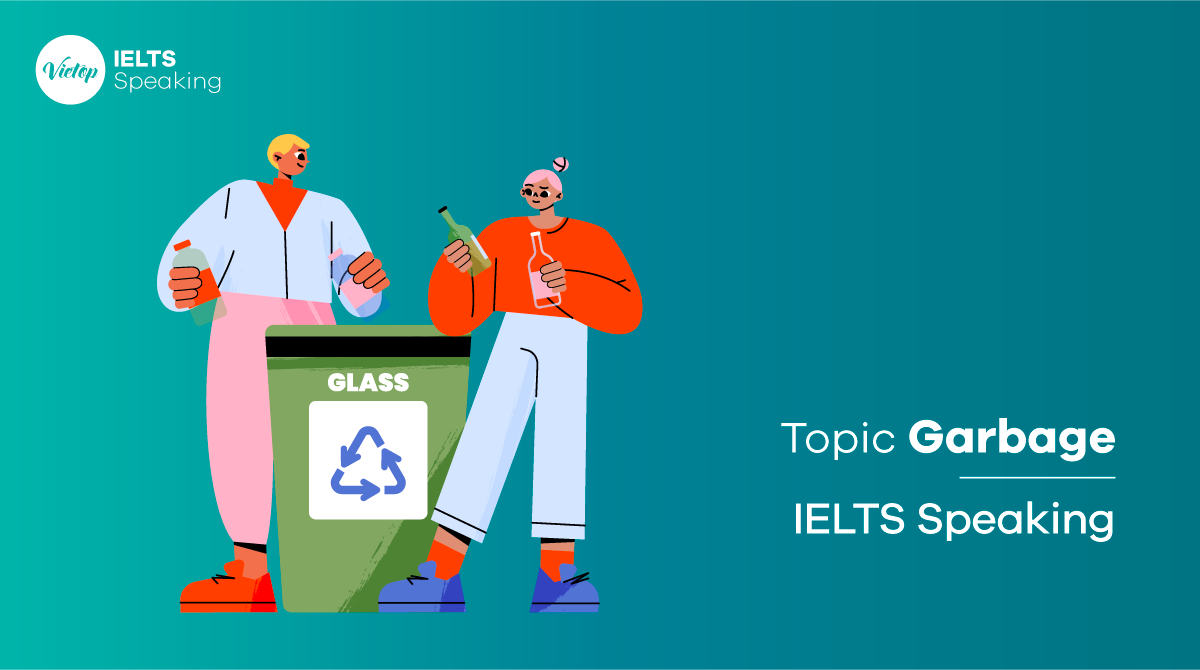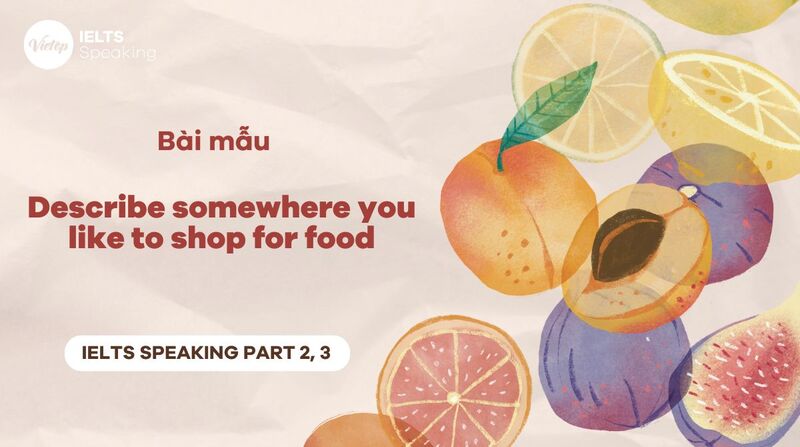Hôm nay qua bài viết dưới đây, Vietop English gửi đến các bạn bài mẫu tham khảo bài mẫu IELTS Speaking Part 1 topic Garbage và một số từ vựng liên quan topic Garbage – rác thải. Đây là một chủ đề thuộc chủ đề lớn Environment – môi trường, vẫn còn khá mới đối với đa số các bạn thí sinh khi thi IELTS Speaking, mời các bạn xem qua nhé!
Từ vựng Topic Garbage – Danh từ

| Từ vựng | Ý nghĩa | Ví dụ |
| Biodegradable | Phân hủy sinh học | Biodegradable waste is capable of being broken down by natural processes such as bacteria or sunlight. |
| Composting | Ủ phân | Composting is a process that turns organic waste into nutrient-rich soil. |
| Debris | Mảnh vụn | The debris left behind after a storm can be dangerous and difficult to clean up. |
| E-waste | Chất thải điện tử | E-waste is electronic waste that is discarded, such as old computers, phones, and televisions. |
| Garbage | Rác | The garbage truck comes every Tuesday to collect our household garbage. |
| Hazardous waste | Chất thải nguy hại | Hazardous waste contains chemicals or other substances that can be harmful to humans or the environment. |
| Industrial waste | Chất thải công nghiệp | Industrial waste is generated by factories and other industrial processes. |
| Junk | Rác (=garbage) | Our garage is full of junk that we need to get rid of. |
| Landfill | Bãi rác | Landfills are sites where garbage is buried in the ground. |
| Litter | Rác (=garbage) | The beach was covered in litter, with plastic bottles and food wrappers scattered everywhere. |
| Packaging | Bao bì | Packaging waste includes materials such as cardboard, plastic, and paper used to wrap products. |
| Plastic | Nhựa | Plastic waste is a major problem for the environment, as it can take hundreds of years to decompose. |
| Pollution | Sự ô nhiễm | Garbage and other pollutants can cause air and water pollution, which can have negative effects on human health. |
| Recycling | Tái chế | Recycling is the process of reusing materials to create new products, reducing the amount of waste that ends up in landfills. |
| Refuse | Từ chối | Refuse is another word for garbage or waste. |
| Rubbish | Rác (=garbage) | Rubbish is a British English term for garbage or waste. |
| Trash | Rác (=garbage) | Trash is another word for garbage or waste. |
| Waste | Rác (=garbage) | Reducing waste is an important way to protect the environment and conserve resources. |
| Organic waste | Chất thải hữu cơ | Organic waste includes food scraps, yard waste, and other biodegradable materials. |
| Incineration | Thiêu hủy | Incineration is the process of burning waste to produce energy or reduce the volume of waste. |
Từ vựng Topic Garbage – Động từ

| Từ vựng | Ý nghĩa | Ví dụ |
| Collect | Thu gom | Garbage trucks collect waste from households and businesses. |
| Compost | Phân hữu cơ | You can compost food scraps and yard waste to create nutrient-rich soil. |
| Discard | Loại bỏ | Don’t discard your garbage in the streets, use a trash bin instead. |
| Dispose | Vứt bỏ, loại bỏ | It’s important to dispose of hazardous waste properly to avoid harming the environment. |
| Dispose of | Vứt bỏ, loại bỏ | It’s important to dispose of hazardous waste properly to avoid harm to the environment and public health. |
| Dump | Xả rác | Illegal dumping of waste can have negative effects on the environment and public health. |
| Eliminate | Loại bỏ | The government’s plan is to eliminate plastic waste by banning single-use plastics and promoting reusable alternatives. |
| Incinerate | Thiêu | Some waste can be incinerated to produce energy or reduce its volume. |
| Landfill | Chôn ở bãi rác | The waste management company decided to landfill the hazardous waste in a designated landfill site. |
| Manage | Quản lý | The city hired a waste management company to manage the collection and disposal of the city’s garbage. |
| Minimize | Thu nhỏ | We should try to minimize our waste by using reusable products and reducing our consumption. |
| Pick up | Nhặt lên | The garbage collectors will pick up our trash on Monday mornings. |
| Recycle | Tái chế | Recycling materials such as paper, plastic, and metal reduces the amount of waste that ends up in landfills. |
| Reduce | Giảm bớt | Reducing waste is an important step in protecting the environment and conserving resources. |
| Reuse | Tái sử dụng | Reusing materials such as clothing, bags, and containers reduces waste and conserves resources. |
| Segregate | Tách biệt | Segregating different types of waste makes it easier to recycle and dispose of them properly. |
| Sort | Loại | Sorting recyclable materials from non-recyclable materials is an important step in reducing waste. |
| Throw away | Vứt đi | Don’t throw away your old electronics, recycle them instead. |
| Trash | Xả rác | Don’t trash the environment, dispose of your waste properly. |
| Waste | Bỏ phí | We should try to reduce food waste by only buying what we need and properly storing leftovers to avoid spoilage. |
Xem thêm: Bảng chữ cái tiếng Anh
Từ vựng Topic Garbage – Tính từ
| Từ vựng | Ý nghĩa | Ví dụ |
| Biodegradable | Có thể phân hủy sinh học | Biodegradable materials can decompose naturally and do not harm the environment. |
| Biodegraded | Đã phân hủy sinh học | Biodegraded materials have been decomposed naturally by microorganisms. |
| Biodegrading | Đang trong quá trình phân hủy sinh học | Biodegrading waste is waste that is currently in the process of decomposing naturally through the action of microorganisms. |
| Composted | Ủ phân | Composted materials have been broken down into nutrient-rich soil. |
| Degradable | Phân hủy | Degradable materials can be broken down naturally, although not as quickly as biodegradable materials. |
| Disposable | Dùng một lần | Disposable items are designed to be used once and then thrown away. |
| Hazardous | Nguy hiểm | Hazardous waste contains materials that can be dangerous to human health and the environment. |
| Industrial | Công nghiệp | Industrial waste is generated by factories and industrial processes. |
| Landfilled | Chôn lấp | Landfilled waste is buried in the ground in a designated landfill site. |
| Littered | Xả rác | Littered areas are covered with trash and debris. |
| Non-biodegradable | Không phân hủy sinh học | Non-biodegradable materials do not decompose naturally and can harm the environment. |
| Organic | Hữu cơ | Organic waste includes food scraps and other biodegradable materials. |
| Plastic | Nhựa | Plastic waste is a major environmental problem, as it takes hundreds of years to decompose. |
| Polluted | Ô nhiễm | Polluted areas have been contaminated by waste and other pollutants. |
| Recyclable | Có thể tái chế | Recyclable materials can be reprocessed and made into new products. |
| Recycled | Tái chế | Recycled materials have been reprocessed and made into new products. |
| Reusable | Tái sử dụng được | Reusable items can be used multiple times, reducing waste and conserving resources. |
| Segregated | Tách biệt | Segregated waste is sorted into different categories for proper disposal and recycling. |
| Toxic | Độc hại | Toxic waste contains materials that can cause harm to human health and the environment. |
| Toxic-free | Không độc hại | Toxic-free products do not contain harmful chemicals or materials. |
Từ vựng Topic Garbage – Trạng từ
| Từ vựng | Ý nghĩa | Ví dụ |
| Carelessly | Một cách bất cẩn | Carelessly throwing your garbage on the ground is harmful to the environment. |
| Efficiently | Hiệu quả | Waste management companies should dispose of waste efficiently to minimize negative impacts on the environment. |
| Hazardously | Nguy hiểm | Hazardously disposal of waste can have negative impacts on human health and the environment. |
| Illegally | Bất hợp pháp | Illegally dumping waste is harmful to the environment and can result in fines or penalties. |
| Industrially | Công nghiệp | Industrially-produced waste can be harmful to the environment if not disposed of properly. |
| Naturally | Một cách tự nhiên | Organic waste can be naturally composted to create nutrient-rich soil for plants. |
| Properly | Đúng cách | It’s essential to properly dispose of hazardous waste to avoid harming the environment and public health. |
| Quickly | Nhanh | Non-biodegradable waste can take hundreds of years to decompose, while biodegradable waste can decompose quickly. |
| Recklessly | Liều lĩnh | Recklessly dumping waste can harm the environment and public health. |
| Responsibly | Có trách nhiệm | We should all dispose of our waste responsibly to minimise negative impacts on the environment. |
| Safely | An toàn | Hazardous waste should be handled and disposed of safely to avoid harm to humans and the environment. |
| Separately | Riêng biệt | You should sort your recyclables separately from your non-recyclables to make the recycling process easier and more efficient. |
| Simultaneously | Đồng thời | We should try to reduce waste and recycle simultaneously to protect the environment and conserve resources. |
| Slowly | Chậm | Plastic waste can take hundreds of years to decompose, decomposing very slowly. |
| Thoroughly | Triệt để | Garbage collectors should thoroughly collect all waste to avoid leaving any behind. |
| Tightly | Chặt chẽ | Garbage bags should be tied tightly to avoid spills and contamination. |
| Unsafely | Không an toàn | Handling hazardous waste unsafely can result in harm to human health and the environment. |
| Unwittingly | Vô tình | Some people may unwittingly contribute to pollution by not disposing of their waste properly. |
| Well | Tốt | Waste management systems should be designed and implemented well to minimize negative impacts on the environment. |
Xem thêm:
Tổng hợp đề thi IELTS Writing 2022 và bài mẫu – Cập nhật liên tục
Bài mẫu IELTS Speaking Part 1 topic Garbage

Mời mọi người nghe Audio topic Garbage part 1 tại đây nhé!
1. What do you do when you see garbage on the street?
When I see rubbish on the street, I usually pick it up and dispose of it properly in a nearby trash can. I think it’s important for us all to do our part in keeping our streets and communities clean.
- Rubbish (n): rác, đồng nghĩa với garbage
- To dispose (v): vứt bỏ
- Properly (adv): đúng cách
- Nearby (adj): gần đó
2. Do you think it’s important to keep the city clean?
Yes, I definitely think that keeping a clean city is quite essential, since not only does it make our streets and neighbourhoods look nicer, but it can also have a positive impact on our environment and our health. Clean cities can help reduce air and water pollution, as well as provide a healthier living environment for everyone. However, I’m also afraid that’s easier said than done.
- Essential (adj): cần thiết, quan trọng
- Neighbourhood (n): khu dân cư
- Impact (n): ảnh hưởng
- Healthier (adj): khỏe mạnh hơn
- Easier said than done: nói thì dễ hơn làm
Luyện tập IELTS Speaking với bài mẫu IELTS Speaking part 1 và IELTS Speaking part 2 nhé!
3. How do you feel when you see other people throw garbage on the street?
When I see such behaviours, I feel frustrated and disappointed. Not only is it a sign of disrespect for our environment, but it can also be a health hazard. I think it’s crucial to educate people about the importance of keeping our cities clean and to encourage them to take responsibility for their actions.
- Frustrated (adj): bực bội
- Disrespect (n): sự không tôn trọng
- Hazard (n): nguy hiểm
- Crucial (adj): quan trọng
- To take responsibility (v): chịu trách nhiệm
4. How often do you recycle things like paper and plastic?
I try to recycle as much as possible. Paper, plastic, and other recyclables are generally separated out and placed in the proper recycling bins. I also make an effort to reuse items like shopping bags and water bottles whenever I can. I believe it’s important to contribute to waste reduction and environmental protection.
- Recyclable (n): đồ có thể tái chế được
- Separate (v): phân ra, chia ra
- To contribute (v): đóng góp
- Waste (n): rác thải
- Reduction (n): giảm thiểu
5. Would you like to help other people to keep your town or city tidy?
Yes, I would definitely like to participate in such activities. It’s necessary for us all to do our part in keeping our streets and neighbourhoods clean. I would be more than happy to help organize clean-up events or volunteer my time to help with other initiatives that promote a cleaner and healthier environment.
- Clean-up event: những sự kiện dọn dẹp môi trường
- To volunteer (v): tình nguyện
- Initiative (n): sáng kiến, chủ động
- To promote (v): khuyến khích
Xem thêm:
- Từ vựng IELTS Speaking Part 1
- Từ vựng tiếng Anh về môi trường
- Bài mẫu topic Hair & Hairstyle – IELTS Speaking part 1
Trên đây là bài mẫu IELTS Speaking Part 1 topic Garbage. Vietop English hy vọng đã có thể giúp các bạn tham khảo được thêm nhiều từ vựng và ý tưởng để chuẩn bị tốt hơn cho chủ đề này. Chúc các bạn học tốt và hẹn các bạn ở những bài viết sau!









